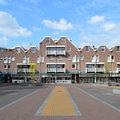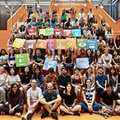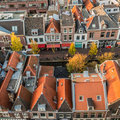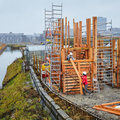News
24 February 2021
Respectful renovation

More than thirty per cent of the Dutch housing stock was built between 1965 and 1985. These homes are due for renovation in the next few years in order for them to meet current demands and requirements in terms of energy consumption, aesthetics, comfort and liveability. How can we ensure a sustainable future for this large, diverse and complex housing stock while respecting the current values of these homes and the living environment?
23 February 2021
Inclusion and diversity at BK

Roberto Rocco has been appointed Diversity and Inclusion Officer for Bouwkunde with the goal to advise the dean and help shape faculty policy and propose action on inclusion and diversity. “As an outsider, I have experienced issues of inclusion and diversity very personally in my life at TU Delft, not always positively. This has given me the tools, the curiosity and the ideas to see diversity and inclusion as highly positive assets and opportunities rather than “problems”, says Roberto.
12 February 2021
Owner-occupied housing market strengthens considerably in fourth quarter despite corona crisis

Central and local governments have maintained the huge support package from the corona crisis until the end of 2020. As a result, relatively few housing consumers have actually been affected by the corona crisis in an economic sense. Combined with a prospect of vaccination, confidence in the owner-occupied housing market is fully restored in the third and fourth quarter of 2020. Residential consumers are daring to buy a (different) house in 2020, at substantial prices.
11 February 2021
BK students build circular watchtower in New Delft

A special object is being built on the Westlandseweg in Delft: a temporary, circular watchtower, made almost entirely of wood without screws, glue or nails. The tower has been designed and is being built by BK students Edmund Thomas Green and Ludvig Sundberg, who won a design competition held by study association D.B.S.G. Stylos and project organisation Nieuw Delft at the end of 2019.
10 February 2021
Bnieuws online

Now that we all work and study from our homes, it is impossible to catch the latest edition of Bnieuws at the faculty building. The editors however continue to work hard and, in addition to a monthly new Bnieuws, have made a lot of effort to make many previous editions available online.
09 February 2021
Architecture student award winner ECIO Frank Award for more inclusive education

Tess Tegelberg, master student, won the ECIO Frank Award with her thesis on how to design better study buildings at the TU. Her conclusion is that designing for students with functional disabilities creates places that are more pleasant for everyone.
06 February 2021
Satisfaction homeworkers and the lack of a coffee machine

How do the Dutch experience the corona measures in their workplace and working from home? Students from the master course Case Studies at the Department of Management of the Built Environment (MBE) put this question into research in cooperation with HEYDAY - facility management. As part of their course, they interviewed employees of a health insurance company, a chemical company, and a municipality.
01 February 2021
TU Delft develops 'brains' for buildings

A large consortium led by TU Delft is going to provide ‘brains’ to buildings. The Dutch Minis-try of Economic Affairs and Climate Policy has allocated 6.9 million euro to the Brains 4 Build-ings project. The objective of the project is to contribute to the development of smart meth-ods and algorithms that add operational intelligence to buildings, in order to make them as energy efficient and comfortable as possible. Professor and scientific coordinator Laure Itard: “Buildings’ energy systems have become so complex that their real time control cannot be achieved by traditional methods. We need much clever approaches using the potential of machine learning and artificial intelligence.”
26 January 2021
Headquarters of DOCOMOMO International coming to TU Delft

At the end of the 1980s, many modern masterpieces had already been demolished or had changed beyond recognition. This was mainly due to the fact, that many were not considered to be elements of heritage, that their original functions had substantially changed and that their technological innovations had not always endured long-term stresses.
26 January 2021
The Future of Port City Regions

What does the future of the port city of Rotterdam look like? How do you maintain the identity of a city in transition, with a growing number of inhabitants, spatial, economic and political interests? For whom does the gentrification of a neighbourhood take place? These are some of the questions studied by the researchers of the Leiden-Delft-Erasmus PortCityFutures programme.